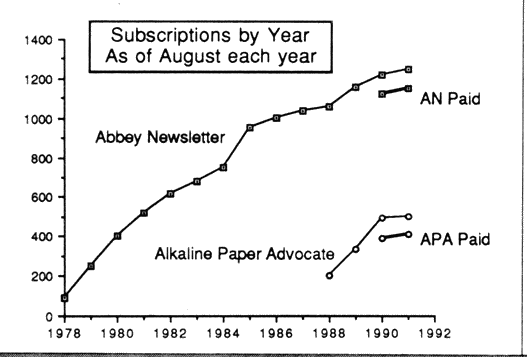

In the October issue, in "A Report to Readers and Supporters," I brought the historical narrative of Abbey Publications up to date and described its goals and working methods. At the end of that report, I promised to discuss future plans in a separate editorial.
Perhaps "plans" was not the right word. That implies something that is ready to be implemented. I would rather talk about the challenges or problems around which my long-range thinking is centered. There are two: expansion to meet the growing demand for preservation information, and the continuity of the enterprise.
I am made constantly aware of how much work there is to be done in this field by how little time there is to write newsletters any more. It is even harder than it used to be when I held down a job and did the newsletter evenings and weekends. My time is spent instead on the increasingly frequent telephone inquiries; the growing flood of reading material to scan; a thriving pH pen business; management of an office with its growing correspondence, library and files; covering more and more conventions; addressing or writing for other groups; national committee work (especially the TAPPI Paper Permanence Committee); and participation in local professional groups. How can I say no to these legitimate demands on my time, all of which are directly related to accomplishing the mission of Abbey Publications
I am weeding the exchange subscriptions to a more manageable number, and plan to step down from committee work, and this will help a bit. I may also have to set aside certain hours and days for newsletter work and just be "not in" to callers at those times. But these are only temporary ways of coping. It would make more sense to involve other preservation professionals in the work, and increase our capacity to respond.
There are two obstacles to involvement of more professionals: 1) the lack of preservation or conservation professionals in Provo who are looking for a job, and 2) our inability at the present time to pay a second professional involved in editorial work.
That first obstacle can be overcome by moving the whole enterprise to Austin, which is already full of book-related activity, and which will become a hotbed of preservation after the Columbia Conservation Education Programs move there this fall. I expect to move there sometime this year.
The second obstacle, lack of money for another salary, can be overcome in two ways: by setting up an internship with outside funding, and by making more money. The Board of Trustees and I are working on both these solutions on a long-term basis. The increase in pH pen prices will help. Increases in newsletter prices, beyond those necessary to keep up with inflation, may also be necessary
Financial help from supporters (see Editor's Page) is substantial and most welcome and useful, but we want to base long-term planning as much as possible on self-generated income. The office has to do what it can to make the operation succeed, in order to deserve the help it receives.
This operation is more than a couple of newsletters; it is a mission-oriented information service. It is effective because it is independent, that is, not part of a larger organization and not dependent on income from advertisers. It would be just as effective, I believe, with somebody else as editor, if they were capable and committed. It is not too early to start thinking about who might succeed me when I retire. In fact, good business practice demands that succession be planned for long in advance.
Expansion seems to offer the key to continuity. If we can expand and get knowledgeable people working for Abbey Publications as office assistants, editorial interns reviewers, and assistant or associate editors, there will be more potential successors, and as soon as our income permits us to offer a decent salary, it will be easier to attract and retain a good person as editor.
